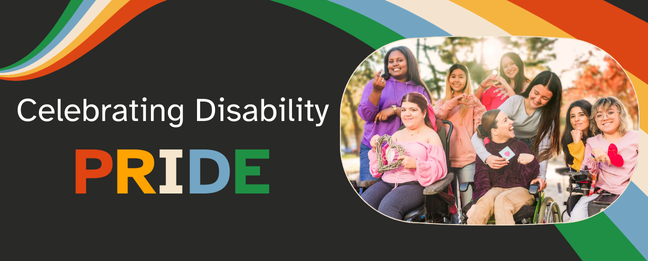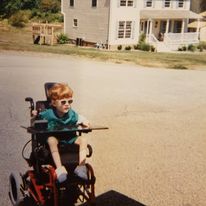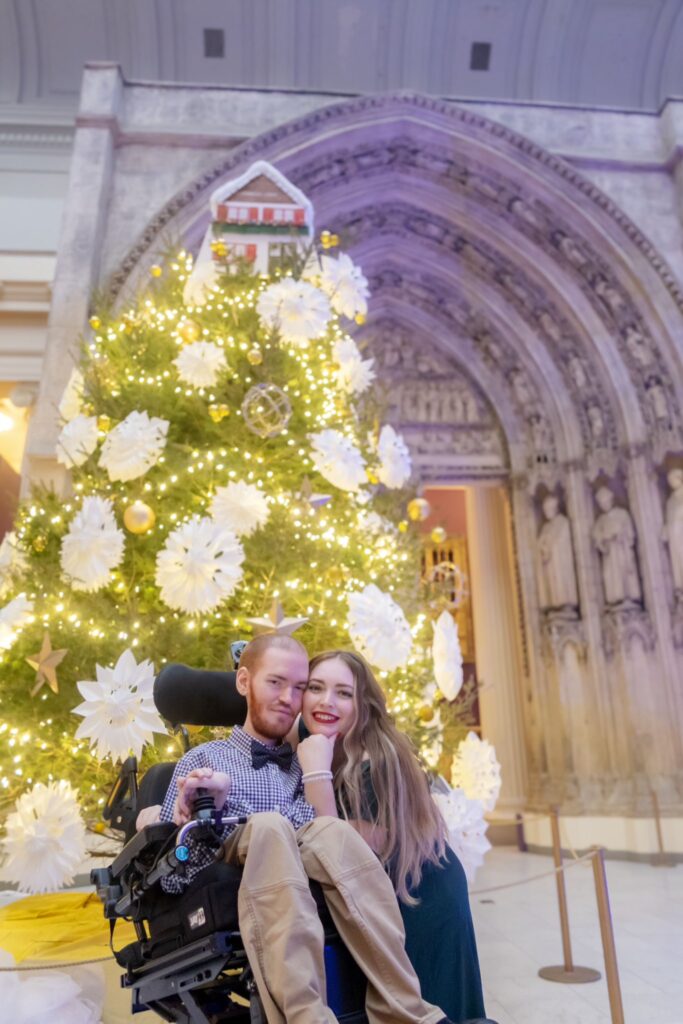Finding Disability Pride Through Community
by Blog Writers

By Grant Stoner
July is Disability Pride Month, a time for disabled individuals to reflect, celebrate, and recognize their lives. Since July 26, 1990, the United States has celebrated Disability Pride Month to commemorate the passing of the Americans with Disabilities Act, an act which provides protections to disabled people from discrimination. Regardless of why you celebrate or the reason for the creation of Disability Pride Month, July is a time to raise awareness regarding the disabled experience.
For me, July’s acknowledgments and festivities are a concept I’m still learning to accept. Despite living with a physical disability my whole life, I’ve only recently embraced my disabled identity. While I can confidently call myself disabled now, I struggled to come to terms with my limitations and identity. It was only through my work as a disabled reporter and interactions with the disabled community that I finally understood who I am.
Ignoring My Disability
 I have numerous fond memories of growing up in the southwestern region of Pennsylvania. From school picnics to a local amusement park, to spending hours cruising through my neighborhood in my red wheelchair, I loved the freedom of exploration. Yet, despite my fondness of the outdoors, I never viewed my wheelchair as an accessibility tool, rather just a pair of legs… with tires. As a child and young adult, I did everything I could to shy away from my disabled side. And every awkward interaction with the public or painful hospitalization made me shrink further into myself. I didn’t want to be disabled, and by refusing to acknowledge my limitations, I thought I could trick myself into being able-bodied.
I have numerous fond memories of growing up in the southwestern region of Pennsylvania. From school picnics to a local amusement park, to spending hours cruising through my neighborhood in my red wheelchair, I loved the freedom of exploration. Yet, despite my fondness of the outdoors, I never viewed my wheelchair as an accessibility tool, rather just a pair of legs… with tires. As a child and young adult, I did everything I could to shy away from my disabled side. And every awkward interaction with the public or painful hospitalization made me shrink further into myself. I didn’t want to be disabled, and by refusing to acknowledge my limitations, I thought I could trick myself into being able-bodied.
Throughout my entire life, I’ve always used accommodations, accessibility, and outside assistance to do anything and everything. I’m unable to feed myself, dress myself, use traditional gaming controllers, sign for long periods, and even set myself up on my computer to work. Despite these obvious accessibility needs and ways of disability survival, I still thought of myself as able-bodied. And it wasn’t until I started writing that I truly understood the importance of accessibility, and my role as a disabled individual.
Accessibility Journalism
Prior to beginning my work as a disabled reporter in the games industry, I originally went to school to become a traditional games journalist. I wanted to review the newest titles, speak with legendary developers, and highlight the latest trends, all without exploring the disabled perspective. Since I didn’t want to discuss accessibility, I convinced myself that nobody wanted to hear these thoughts either. And for several years, I followed these beliefs in the school newspaper. I wrote reviews that, for years, I was never proud of, but unable to accurately explain why. They lacked depth, substance, and general feelings that I, the player of each game, was unable to properly articulate. It wasn’t because I lacked the skills of a writer. I had incredible editors to polish my words with each piece. Instead, it was my lack of connecting with the game without mentioning my needs as a disabled player.
Approximately six months after graduating with a bachelors in Multiplatform Journalism, one of my best friends and editor of the school newspaper informed me that my Nintendo Switch review won second place in the Keystone Press Awards review category. Why? It was my first review where I explicitly referenced my disability. Prior to writing the piece, I was going to submit a standard review, just like my previous work for several years. However, my friend told me to write it from my perspective of someone with a physical disability, threatening to not publish the story if I did not put myself into the piece. From that moment on, I felt myself understanding the importance of embracing my disabled identity. And even though I initially struggled to accept these newfound emotions, I continued to write as a disabled journalist.
Finding A Community

In 2019, I began working at Can I Play That, a publication dedicated exclusively to the disabled perspective in the gaming industry. My role as Mobility Editor was to publish reviews from a mobility lens, but to also interview developers and connect with the disabled community. At first, I was hesitant to accept this role. How could I cover the thoughts and needs of other disabled individuals when I only recently began advocating for them myself? And it was admittedly a challenge. I was fearful of asking the wrong questions, posting the wrong content on social media, and misrepresenting the words of a community that, despite living in my entire life, only recently embraced. Yet, my fears were calmed relatively quickly. Not because of my work, but rather the warmth and kindness of my disabled peers.
It’s now 2024, and this September marks five years since I became a disability reporter. Since then, I have met some of my closest friends, had the privilege of interviewing incredible consultants, and even met my partner through work. And every person or group I just listed has one thing in common – they are all part of the disabled community. For so long I fought so hard to erase my disability, to exist in a world where I wasn’t disabled. But in the five years that I’ve been exclusively working with the disabled community, fully embracing my disabled identity, I have never felt more welcomed by others, and most importantly, at peace with myself.
Disability Pride Month is multifaceted with its importance. For some, it’s a time to continue pushing for the rights of disabled people. For others, it’s a time to celebrate the disabled experience with friends and family. For me, it’s a month of reflection. I wish I could go back in time to tell my younger self that it’s okay to be disabled. I wish I could tell him about the amazing community that was waiting for him. But now, instead of mourning a childhood without a love of disability, I can confidently start each day feeling proud of myself. For this Disability Pride Month, I’m proud to be disabled.
Grant Stoner is a disabled journalist covering accessibility and the disabled perspective in the gaming industry. When not writing, he is usually screaming about Pokémon or his cat, Goomba, on social media.






